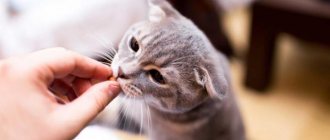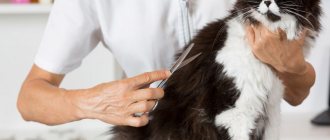Close contacts with pets may not always end positively. The cat's body contains many parasites and microorganisms that are transmitted to owners through scratches or the animal's saliva. Many of the diseases cause serious impairment. Therefore, it is important to monitor the cat’s health and your well-being after contact with it.
Health hazard
Despite the fact that cats are considered one of the cleanest representatives of the animal world, they carry a lot of pathogens on their fur. Even if the pet was purchased from a trusted place with all the relevant medical documents, never leaves the apartment and currently looks healthy, it can infect a person with dangerous diseases.
Doctors warn that some of the diseases in rare cases lead to disability, and sometimes even death!
Toxoplasmosis
The most popular “reward” that can be obtained from excessive love for a cat. The causative agent of the infection is a parasite called toxoplasma. The disease is manifested by redness of the eyes, nasal discharge, and upset stool.
At the first meeting with parasites, the cat suffers from fever, cough, shortness of breath, trembling in the paws, and purulent discharge from the eyes. Regardless of the stage of the disease, an animal can infect a person. Once in the human body, parasites multiply and destroy cells of the brain and internal organs.
The first symptoms of toxoplasmosis are similar to a cold. In the chronic course, abdominal pain, changes in heart rate, memory impairment, apathy, decreased performance, increased body temperature up to 37.5 degrees, blurred vision, dizziness, menstrual irregularities, and impotence are noted. Toxoplasma is especially dangerous for pregnant women, since the parasites are able to penetrate the placenta and cause deformity and/or death of the child, and provoke miscarriage.
Felinosis
Not all cats enthusiastically accept kisses from their owners; some may respond by scratching or biting. If the skin is damaged, felinosis may develop (or as it is also called “cat scratch disease”). Infectious agents are present in the mucous flora of the cat's mouth. From the moment of injury until the first symptoms appear, up to 40 days pass. At the very beginning, a rash appears at the site of the scratch; after a few days, the pimples fill with pus, and after a couple of weeks, the lymph nodes enlarge and become painful.
All this is accompanied by headaches, increased body temperature, and chills. As a rule, the disease goes away on its own after some time, but in rare cases complications are possible.
Salmonella
You can become infected by kissing a cat with such a dangerous disease as salmonellosis. The causative agent of the infection is a microorganism that remains viable for up to six months. It is not afraid of ultraviolet radiation, it dies only at high (at least 100 degrees) and low (below -85 degrees) temperatures, when treated with aggressive disinfectants (but only after 20 minutes). You can tell that an animal has become infected by vomiting, diarrhea, lethargy, abnormal heart rhythm, and drooling. As a rule, the disease is difficult for young individuals to tolerate; in adults it is not as active.
In humans, symptoms of salmonellosis include fever, abdominal pain, indigestion, dizziness, and coated tongue. There are 3 types: asymptomatic, generalized and septic (the most dangerous) salmonellosis, which can be fatal if not treated sufficiently.
Helminthiasis
As a sign of “gratitude” for a kiss, a domestic cat can “give” helminths. Kittens are especially dangerous, since it is in young organisms that various kinds of parasites especially like to appear. If a pet eats a lot, but does not gain weight, but, on the contrary, rapidly loses weight, then this is one of the signs that uninvited guests have taken up residence in the body. Symptoms of infection also include lethargy, stool problems, hair loss, bloating, and others.
The damage to the human body by helminths is indicated by skin rashes and enlarged lymph nodes. If no measures are taken, nausea, abdominal pain, disturbances in the gastrointestinal tract, enlargement of internal organs, pain in joints and muscles are possible.
Ringworm
Long-haired breeds often suffer from a condition known as ringworm. Fungi remain dangerous for up to 5 years. The first symptoms are redness and rash on the pet's body. Then they grow into lesions and become crusty. After this, hair stops growing on the areas affected by lichen, and oily scales appear on the skin. The patient looks lethargic and tired, and if he is not treated promptly, then people can become infected. The most vulnerable are children under 14 years of age, as well as young women.
Rabies
Of course, it would hardly occur to a sane person to kiss street cats, but a warning should still be given. Stray animals are often carriers of rabies. About 55,000 people die from this dangerous disease in the world every year. The worst thing is that there is still no vaccine for this disease. It is transmitted primarily from dogs, but felines can also be carriers. It is transmitted through salivary fluid through a bite or when it comes into contact with abraded skin. If such contact occurs, you should immediately get an anti-rabies vaccination.
Psychological reasons
Among the reasons why you should not kiss cats are several psychological factors. Pussies have become such a part of our lives that we can no longer imagine existing without them. But they were never able to learn human language. This means that all expressions of love must be expressed in their language.
Some animals are simply irritated by their owner's excessive kissing. They do not understand that we are expressing our affection for them in this way, and may perceive such actions as a threat or restriction of personal freedom. These animals do not like either the first or the second. Some of them begin to take revenge on their owners: shitting in shoes, tearing curtains, scratching wallpaper, digging up soil from flower pots, and so on. If your pet has never sinned with such behavior before, and then suddenly it “comes over” – think about it. It is quite possible that you have overdone the display of love and affection, and have recently been “squeezing” the animal too much.
It's better to show your love for your fluffy in other ways. You can treat the animal with a treat, scratch it behind the ear, stroke it, or play.
Popular beliefs
Superstitious people are convinced that cats should not be kissed because they have mystical powers. According to beliefs, if you kiss an animal on the face at least once, the evil spirit that lives in the cat will enter the person. After that, he becomes a hostage, a slave of the pet. He will not be able to love anyone, he will lose strength, become depressed, and for the sake of his favorite he will be ready to commit any, even the most reckless act.
Interesting fact: In the US, parents tell their children that if they kiss a cat, they will wake up in the morning and find they have a mustache!
There is another belief, after learning about which, hardly anyone will want to kiss a cat. The fact is that people who forcefully kiss a pet can make it angry, and as a sign of revenge, it will begin to do harm - walking past the litter box, disturbing sleep, spoiling things.
Microbes
“In terms of overall cleanliness, kissing your pet on the mouth is not a good idea,” explains Omar Garner, Ph.D., assistant professor of pathology and laboratory medicine and associate director of clinical microbiology at Los Angeles Health System.
Let's start with an inconvenient but obvious truth - your pets' mouths are not clean. They use it for completely unsterile activities, such as licking spills on the kitchen floor, examining dead birds on the sidewalk with it, and cleaning out their anus. As a result, particles of questionable substances remain in the oral cavity, which are transmitted to humans when cats lick them. But can this harm our health? Let's figure it out.
How to avoid unpleasant consequences
Even if you don't kiss cats, there is still a danger of contracting one of the listed infections. However, there are several measures that will help protect yourself and your loved ones:
- Remember to take your pet to the veterinarian periodically to diagnose the disease in its early stages. Regularly give him antihistamines and fight skin parasites (fleas are carriers of many diseases). Get vaccinated.
- Do not indulge your pet with raw meat; choose food responsibly, giving preference to high-quality food from trusted brands.
- Do not tease animals, especially when they are eating or sleeping.
- Do not show aggression towards your pet - do not shout at him, do not hit him, do not swing at him. Make sure that children do not drag him by the tail or poke him in the face with various objects.
- Clean your cat's litter box daily, and be sure to wear gloves. After the procedure, wash your hands thoroughly with antimicrobial soap.
- Regularly carry out wet cleaning in the hallway - a lot of infection gets into the apartment on the soles, to which the smaller brothers are so vulnerable.
Even if all these recommendations are followed, there are groups of people who are advised to minimize interaction with cats. Among them: newborns, pregnant women, HIV-infected people, those undergoing or recently undergoing chemotherapy, taking anabolic steroids.
Video about why you shouldn't kiss cats:
Why can't you kiss cats?
Scientific version
A kissed cat can transmit many diseases or parasites to the owner along with the kiss. Cat fur creates an excellent environment for the development and reproduction of many microorganisms. The wool creates comfortable conditions and maintains the necessary temperature for bacteria. Therefore, when the owner comes into contact with an animal, some microbes are transferred to the human body. Some of them negatively affect the health of the cat owner. And not all cats carefully monitor hygiene; this especially applies to street animals or pets that are not constantly in the apartment.
Fleas cause great harm. They mainly live on the body of a cat who loves to walk outside. Their bite can cause a number of diseases. Another reason why you should not kiss cats on the face, nose, or bring the animal close to your face is dust mites. They are usually invisible without a microscope. But they jump from cat to owner only upon contact with fur and cause allergies. Therefore, even a simple peck on the stomach or back of a cat leads to serious violations.
Protein from animal saliva may be unsafe for humans.
Even if the cat is absolutely healthy and free of parasites, it is still advisable to refrain from close contacts. This is due to the fact that some of the pet’s saliva can get onto the person through kissing. This liquid contains a certain amount of protein, which is characteristic of a certain type of animal. The body perceives them as hostile elements, and therefore an inflammatory process begins to develop. Therefore, you should refuse contact with the animal, even if you really like it and want to kiss the animal.
Superstitious
There are several popular theories why cats should not be kissed, even if they are kept at home. It has long been believed that cats are connected with the other world or are assistants to witches. Therefore, many say that after contact with a cat, a person becomes his slave and will serve him until his death. At the same time, all vital forces leave the owner of the animal. The other reason is more mundane. They say that after a kiss, a kitten may lose its sense of smell. But this fact has not been proven by scientists.
If a child in the USA climbs up to a pet and wants to kiss it, the parents say that after contact with the cat, a mustache appears. Some argue that such closeness may make the cat angry, she will stop treating her owner favorably and will take revenge for the insult inflicted on her. It is believed that such prejudices are associated with attempts to isolate owners from close contact with pets in order to prevent infection.
Main risks
If we think sensibly, then the very formulation of the question “why can’t you kiss cats?” sounds weird. We are not inclined to enter into close relationships with unfamiliar or sick people. Why don’t we beware of tactile proximity with pets, which can be carriers of a hidden infection?
There are a number of dangerous zoonotic diseases that a pet can reward its loving owner:
- disorders caused by ubiquitous bacteria: pasteurella, staphylococcus, E. coli, salmonella;
- lichen is a common fungal infection that is easily transmitted from cats to humans; being relatively harmless, cat lichen requires treatment that is unpleasant for children - the main target of the parasitic scourge;
- cat scratch fever, caused by the microbe Bartonella and occurring in an acute form with severe intoxication;
- toxoplasmosis is a parasitic infection transmitted to people from a sick animal through kissing or careless handling of cat litter or litter.
If a four-legged pet is diagnosed with one of the listed diseases, the question of whether cats can be kissed is clearly inappropriate. Be careful and keep your distance from your pet until it gets better.










